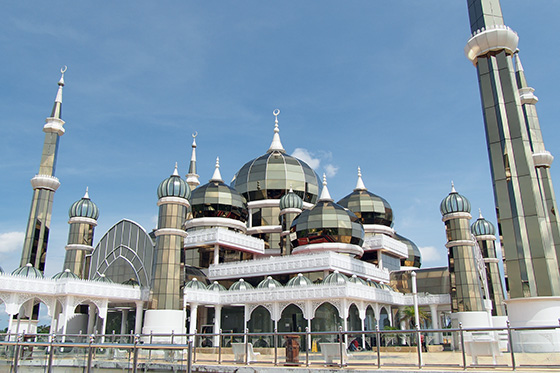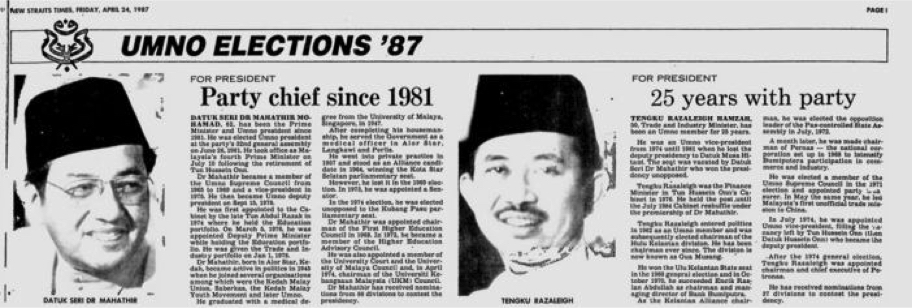
1988 Consti Crisis
Not published yet ago ArjunNot too long ago, we wrote about allegations made by a judge named Backer about certain corrupt practices in our judicial system. Without getting into too much detail, Backer alleged that judges were deciding certain cases in favour of the government with the hopes of promotion. In addition to that he also alleged that judges allowed the courts to be used for government officials to launder money.

While corrupt practices like this is bad for country, the repercussions may be bigger than you think. With such lack of independence between the government and judiciary (which is necessary for a functioning democracy), the government could potentially get away with unlawful acts.
But it has been argued that judiciary was not always allegedly like this. Apparently according to even scholars, before 1988 we had a very independent judiciary and some of the best judges in the Commonwealth…
1988 and before
We couldn’t go sifting through every single case decided by our courts before 1988, but what did find was an article on JSTOR written by a scholar named A.J Harding. In it he listed down a few cases showing court cases involving the government, and the courts actually decided AGAINST the government IF their actions were unlawful. Mind you A.J Harding isn’t trying to say that all cases involving the government was lost by the government – they only lost if a judge found that a government action was illegal. So here are 3 examples given by A.J Harding:

This case concerned a journalist from the Asian Wall Street Journal (ASWJ) who was based in Malaysia named JP. JP and the ASWJ reported certain news pieces that allegedly showed certain unsavoury behaviours concerning the Malaysian government. The Malaysian government in turn revoked JP’s work permit.
JP then brought the government to court to challenge the revocation of his permit, and the court actually gave judgement in favour of him – basically cancelling the act of the government because it was unlawful.

Mamat and a couple other fellows were allegedly conducting activities in a mosque without authorisation. The government charged them under then Section 298A of the Penal Code which states that it’s illegal to prejudice disunity among those professing the muslim faith.
In court, Mamat didn’t do what normal accused people do – which is show evidence he didn’t commit the crime. Instead, he claimed that the law in question (s294A) was unlawful because it goes against the constitution which states that islamic law is a matter of individual states not the federation.
The court agreed with them and basically declared s294A as null and void.

Persatuan Aliran is a registered society promoting reform movements. They published magazines called the Aliran Monthly, with an annual permit for publishing by the government.
They in turn tried to obtain a permit to publish another Malay magazine called Seruan Aliran, but it was rejected by the Ministry of Home Affairs. The decision of the government was challenged in courts, and the court found that the decision was no in-line with already established legal principles. The decision of the ministry was thus cancelled off.
1988 UMNO Elections

Now that you’re all woke about how our courts were so independent, that they were okay striking down government actions when it was illegal, we shall discuss the event that may have stopped that.
So for this part of the story, we’re gonna tell you how a party election results was challenged in our courts.
UMNO, the party which basically founded Malaysia had elections for their President in 1988. The results of that election resulted in a win for Mahathir by a small majority of 43 votes. Tengku Razaleigh who wasn’t satisfied got his friends to challenge that decision in court asking for re-election. But what the court did instead was declare UMNO as an illegal party (there are legal reasonings behind this decision which we will explain in a separate article in the future, so stay tuned).
What happened next was Mahathir forming a new party called UMNO Baru and Tengku Razaleigh’s friends sought to appeal the court decision. They basically die-die wanted a re-election. And while all that was taking place…
The leader of the judiciary wanted to hear the appeal

At that time the head of the judiciary (called the Lord President back then) Tun Salleh Abas, decided that the appeal should be heard. In fact he thought the appeal was so important that it should be heard by all 9 judges of the Supreme Court (that was what the Federal Court was known as once upon a time). Usually cases in the Federal/Supreme Court would be heard by 5 judges.
2 things were also happening or also have happened while Tun Salleh was considering the appeal:
- Parliament was trying to push a law to lessen the powers of the judiciary. Back then, the powers of the courts come from the Federal Constitution, and the changes would result in the courts having powers only prescribed by Parliament itself.
- Mahathir was making statements that attacked the judiciary. He basically suggested that the courts are not interpreting the laws according to the intention of the law itself.
Given that such actions could affect the independence of the judiciary, Tun Salleh wrote a letter to the YDPA asking His Majesty to reduce the tension between the government and courts.

Then for reasons unknown the YDPA wasn’t too happy about the letter received, and according to Mahathir the YDPA asked for a tribunal to be set up to consider whether Tun Salleh Abas should stay in the judiciary. In Malaysia, the Federal Constitution says that the only way to fire a judge for misconduct is to set up a tribunal.
When the tribunal was set up, Tun Salleh Abas objected to it on certain grounds. First he opposed the Chairman of the Tribunal, because the chairman was next in line to head the judiciary if Tun Salleh Abas was dismissed by the Tribunal. That would be like the Deputy Prime Minister Wan Azizah prosecuting Prime Minister Mahathir for a crime. Next, there was also criticism that the normal rules of evidence that applies to our local courts were not used. This is important because the court will only allow evidence considered fair to be admitted during trial. Like for example, a confession obtained as a result of a beating will not be allowed in court. But, strict rules such as those were not applied in the tribunal.
Nevertheless despite Tun Salleh Abas’ objections, the tribunal proceeded. The tribunal eventually found that Tun Salleh Abas was guilty of complaining about the government on various occasions. The result of that was, Tun Salleh Abas was dismissed as a judge.
I'm so woke I don't sleep